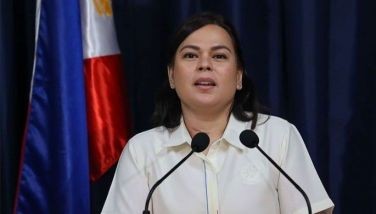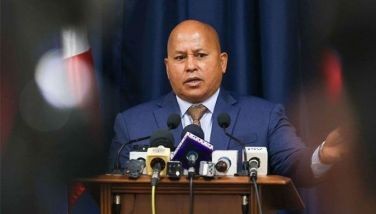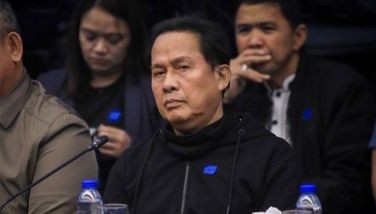‘Equitable PCI violated bank secrecy law’
April 25, 2002 | 12:00am
A lawyer of former President Joseph Estrada said officials of Equitable-PCI Bank may have violated the bank secrecy law when they revealed the Jose Velarde accounts in Estrada’s impeachment trial two years ago.
Prospero Crescini, one of the deposed leader’s 13 court-appointed counsels de officio, also maintained that the accounts were owned not by Estrada, but by his friend, Jaime Dichaves.
He said the accounts – the key evidence in Estrada’s corruption trial as well as in the impeachment trial – are protected by Republic Act 6791 or the Bank Secrecy Law.
Crescini made these conclusions after Manuel Curato, head of Equitable-PCI Bank’s legal services, testified during cross-examination yesterday that bank officials and employees are barred from revealing details of bank accounts "without the consent of the bank owner or without valid order from a competent court."
"Section 55.1 of RA 6791 or the Bank Secrecy Law states that without the consent of the account owner or in the absence of any order from a competent court, no bank employees or officers can disclose accounts, if the account belongs to a private individual.
The only exception is that if the account owner is a public officer. But the owner of the Jose Velarde accounts is Dichaves," Crescini said.
"The former president signed the documents without reading them. He was only guided by Ocampo."
During the impeachment trial, Dichaves wrote a letter to the Senate claiming ownership of the accounts shortly after Curato and another bank official, Clarissa Ocampo, told senators that Estrada signed "Jose Velarde" on bank documents on Feb. 4, 2000.
Curato earlier told the Sandiganbayan that Estrada signed the documents after Ocampo explained the procedure.
However, Crescini argued that Ocampo recognized that Estrada was not Jose Velarde because she did not authenticate the bank documents after Estrada had signed them.
He also pointed out that Estrada signed a loan document or an investment management agreement under the printed words "the principal(s) by." This indicated that Estrada signed merely as a representative of the accounts’ owner.
"When you don’t authenticate, you don’t believe that the one signing the documents is the owner of the accounts. If they only presumed, Ocampo believed that the account was not owned by Estrada," Crescini countered.
Curato and Ocampo were forced to testify against Estrada to save the bank from collapse, Crescini claimed.
During the aborted impeachment trial, Equitable’s total deposits went down from P165.8 billion to P132.58 billion due to massive withdrawals when the bank was tagged as Estrada’s "crony" bank.
Prospero Crescini, one of the deposed leader’s 13 court-appointed counsels de officio, also maintained that the accounts were owned not by Estrada, but by his friend, Jaime Dichaves.
He said the accounts – the key evidence in Estrada’s corruption trial as well as in the impeachment trial – are protected by Republic Act 6791 or the Bank Secrecy Law.
Crescini made these conclusions after Manuel Curato, head of Equitable-PCI Bank’s legal services, testified during cross-examination yesterday that bank officials and employees are barred from revealing details of bank accounts "without the consent of the bank owner or without valid order from a competent court."
"Section 55.1 of RA 6791 or the Bank Secrecy Law states that without the consent of the account owner or in the absence of any order from a competent court, no bank employees or officers can disclose accounts, if the account belongs to a private individual.
The only exception is that if the account owner is a public officer. But the owner of the Jose Velarde accounts is Dichaves," Crescini said.
"The former president signed the documents without reading them. He was only guided by Ocampo."
During the impeachment trial, Dichaves wrote a letter to the Senate claiming ownership of the accounts shortly after Curato and another bank official, Clarissa Ocampo, told senators that Estrada signed "Jose Velarde" on bank documents on Feb. 4, 2000.
Curato earlier told the Sandiganbayan that Estrada signed the documents after Ocampo explained the procedure.
However, Crescini argued that Ocampo recognized that Estrada was not Jose Velarde because she did not authenticate the bank documents after Estrada had signed them.
He also pointed out that Estrada signed a loan document or an investment management agreement under the printed words "the principal(s) by." This indicated that Estrada signed merely as a representative of the accounts’ owner.
"When you don’t authenticate, you don’t believe that the one signing the documents is the owner of the accounts. If they only presumed, Ocampo believed that the account was not owned by Estrada," Crescini countered.
Curato and Ocampo were forced to testify against Estrada to save the bank from collapse, Crescini claimed.
During the aborted impeachment trial, Equitable’s total deposits went down from P165.8 billion to P132.58 billion due to massive withdrawals when the bank was tagged as Estrada’s "crony" bank.
BrandSpace Articles
<
>
- Latest
- Trending
Trending
Latest
Trending
Latest
Recommended

































